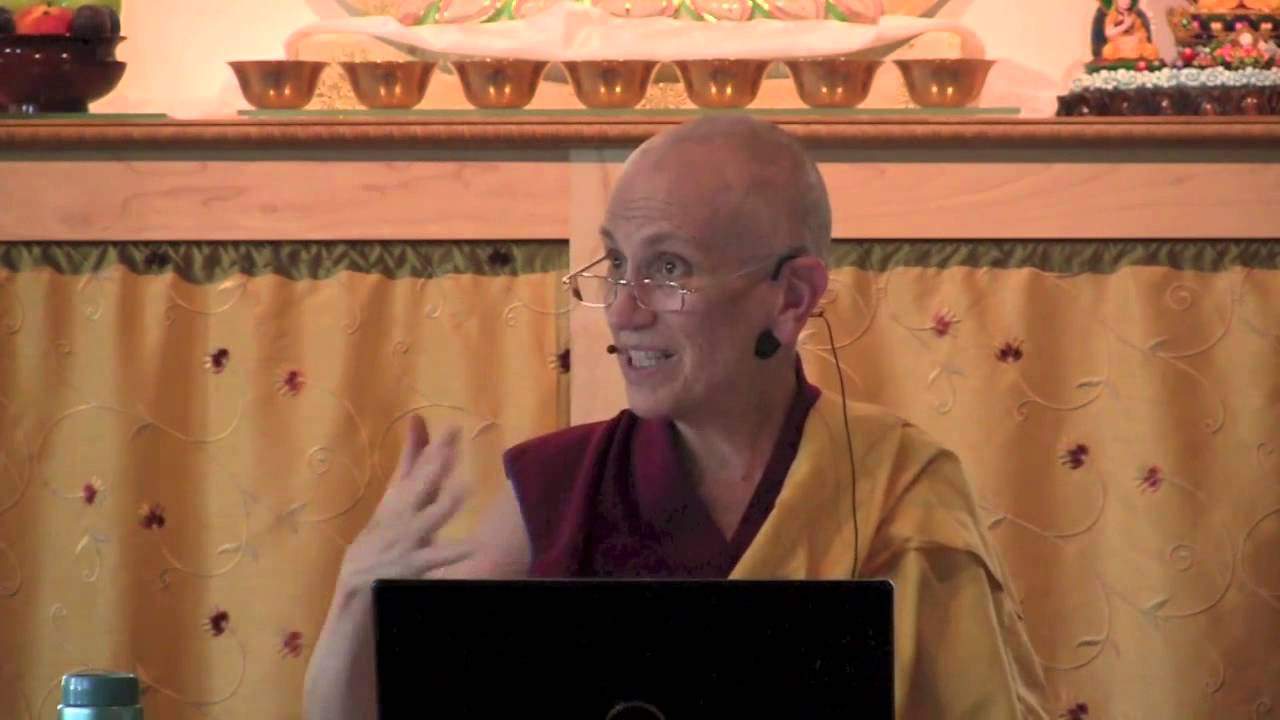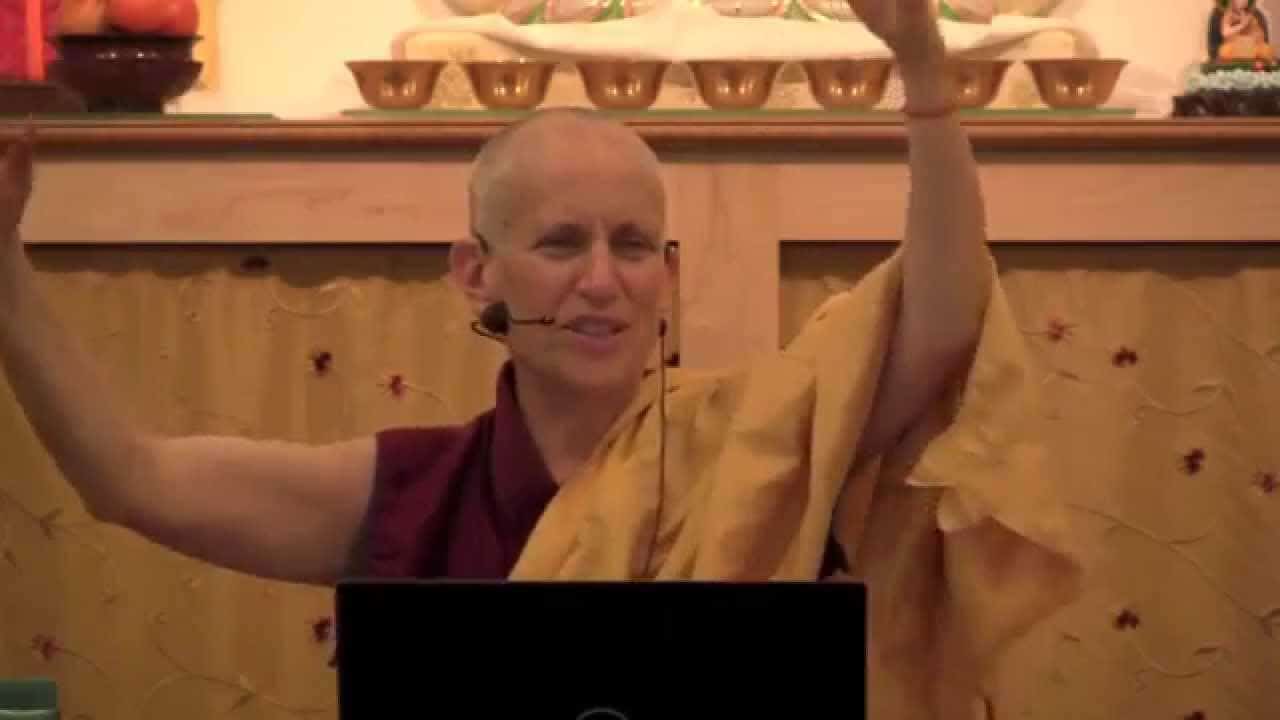Experiencing the results of karma
Part of a series of teachings on the text The Essence of a Human Life: Words of Advice for Lay Practitioners by Je Rinpoche (Lama Tsongkhapa).
- How karma affects our habits and our experiences in life
- Results of karma
- Ripening result
- Environmental result
- Causally concordant results (in terms of experience and in terms of habits)
The Essence of a Human Life: Experiencing the results of karma (download)
“From bad will come the long and unbearable pain
of the three lower realms;
from good the higher, happier realms
from which to swiftly enter the echelons of awakening.”
Know this and think upon it day after day.
This is talking about the topic of karma and especially emphasizing the results of having a fortunate rebirth. The reason that result is emphasized so much is because in order to attain full awakening we’re going to need a series of fortunate rebirths, because we’re not going to be able to actualize the path in one life most likely so we need to be sure to create the causes for a series of good rebirths. Nagarjuna talked about that in Precious Garland, remember? That’s why they’re emphasizing what’s called the “ripening result” (or the “maturation result”), in other words, the future rebirth that we get born into.
However, that’s not the only kind of result of karma. Our actions also bring results that correspond to the cause. These could be results such as we experience what we do towards others. In other words, we steal from others, then our possessions get stolen. We tell other people off, later on we get told off. You know how we all go “why me?” when something bad happens? Well, this is the answer to it. Just reflect on the causally concordant results of our actions and that’s “why me?” In both the sense when we have problems, and when we occasionally think “why me?” do I have so many good conditions. It also answers that because we created those causes in terms of our behavior.
There’s another result, which is perhaps the most serious result, which is also a causally concordant result, but this is in terms of our habitual behavior. In other words, one result of our actions is the tendency to do them again. They become habitual. As we all know, in our lives, habits are very important. If we have good habits life becomes very easy because we are creatures of habit. If we have healthy mental habits and have trained our mind to think in a positive way, to speak in a kind way, to act with kindness, then these kinds of actions happen more spontaneously without so much thought or effort, and we wind up creating a lot of positive karma in that way.
Similarly, because we’re creatures of habit, if we have very harmful mental ways of looking at things—like our old habit patterns of feeling sorry for ourselves, or disliking authority, or complaining, or falling in love with the first person we see, or getting angry at the smallest thing, or getting into co-dependent relationships, all these things—if we develop those kinds of habits, then it creates the cause, again in future lives, to have those kinds of habits.
This result in particular is perhaps the most important. The other results you experience and they end. This result you keep creating the same thing again and again and again, creating more and more and more causes to experience more and more confusion and misery. That’s why really looking at our mental habits—especially, I think, our mental habits, our emotional habits—instead of just thinking that our emotions, whatever emotion comes to mind, is the only natural one that every normal person would experience, therefore it’s the right emotion and I’m entitled to be angry and so on. Instead of looking at our emotions that way, to be able to step back and say, “Is this emotional response realistic for the situation and is it beneficial for the situation? And if it’s not realistic because our inappropriate attention has made up some wild story, or if it’s not beneficial because … it’s going to produce some old behavior that just, same old, same old, then we need to stop and really correct our mental attitude, change our emotion. Don’t regard emotions as cast in concrete, that “well, that’s how I feel so no sense changing them.” No. We definitely can recondition ourselves so that we look at situations differently and have different emotions regarding things.
The other kind of result is what they call the environmental result. That has to do with where we’re born. When the skies a few weeks ago were filled with smoke and it was really hot outside, well, that’s an environmental result that all of us collectively experience because collectively we created the karma for that. It’s beautiful out now, clear sky, great temperature, we also created the cause to experience this kind of climate. Similarly, with climate change, if we live in an area that experiences very strong results of climate change—like I think we have here with our winters getting noticeably shorter, and summers hotter—that is an environmental result of our previous actions. If you live in a place where the food is healthy and the medicines work, it’s an environmental result. So is being born in a place where the food is not very nourishing or full of chemicals or difficult to get, and the medicines also don’t work or it’s very difficult to procure them. All of these kinds of situations that we accumulate are results of our own actions.
I’ll get into what those actions are later, but these are the kinds of results. And in a general way we can say whenever we experience happiness, that’s the result of creating good causes virtuous causes. Whenever we experience misery, unpleasant situation, it’s the result of our own non-virtuous (or destructive) actions.
It’s an interesting way to view your life. Instead of “I’m entitled to everything I want!” It’s like, well, whatever I’m experiencing is the result of the causes I created in the past. And what I’m doing now is creating the causes for what I will experience in the future. So I need to be attentive to the causes that I create.
When we offer our food we’re creating virtuous causes by making offerings to the Three Jewels. When we do the five contemplations also, we’re really refining our intention to eat, how our attitude for eating. So all of that is creating karma that will have a result. We’re not just kind of doing this because, well, that’s what you’re supposed to do to be a “good Buddhist.” We’re doing this to really enrich our minds with merit by creating these virtuous causes.
Venerable Thubten Chodron
Venerable Chodron emphasizes the practical application of Buddha’s teachings in our daily lives and is especially skilled at explaining them in ways easily understood and practiced by Westerners. She is well known for her warm, humorous, and lucid teachings. She was ordained as a Buddhist nun in 1977 by Kyabje Ling Rinpoche in Dharamsala, India, and in 1986 she received bhikshuni (full) ordination in Taiwan. Read her full bio.


